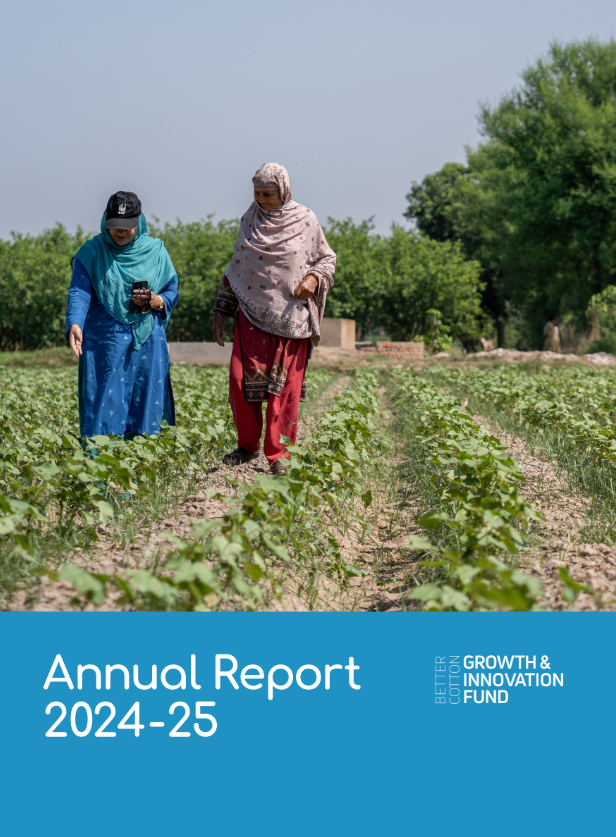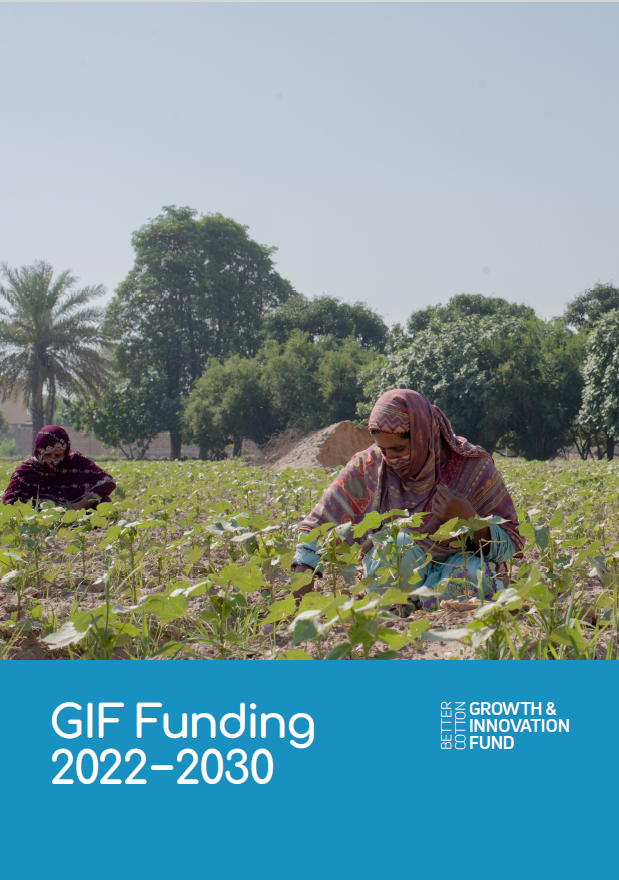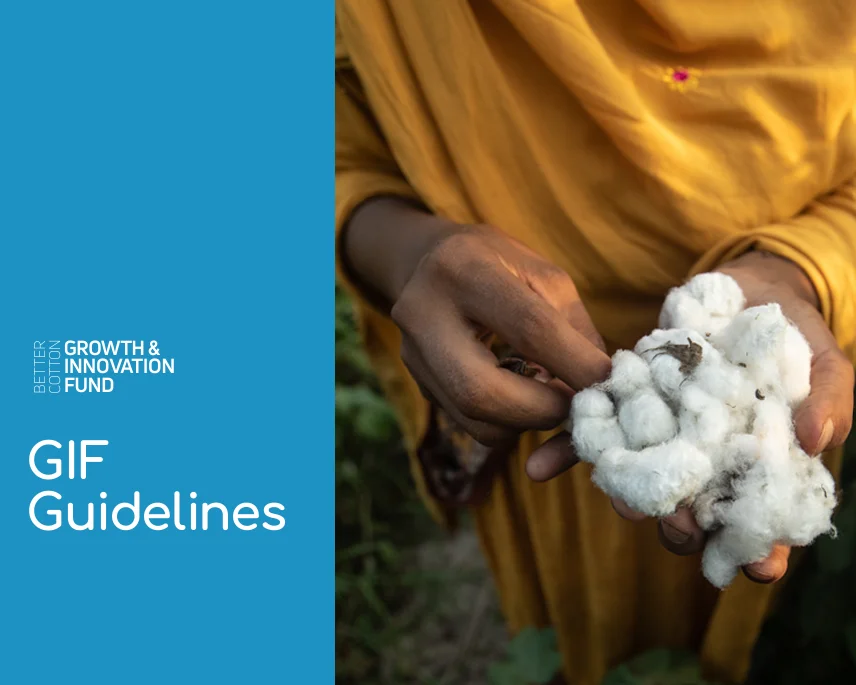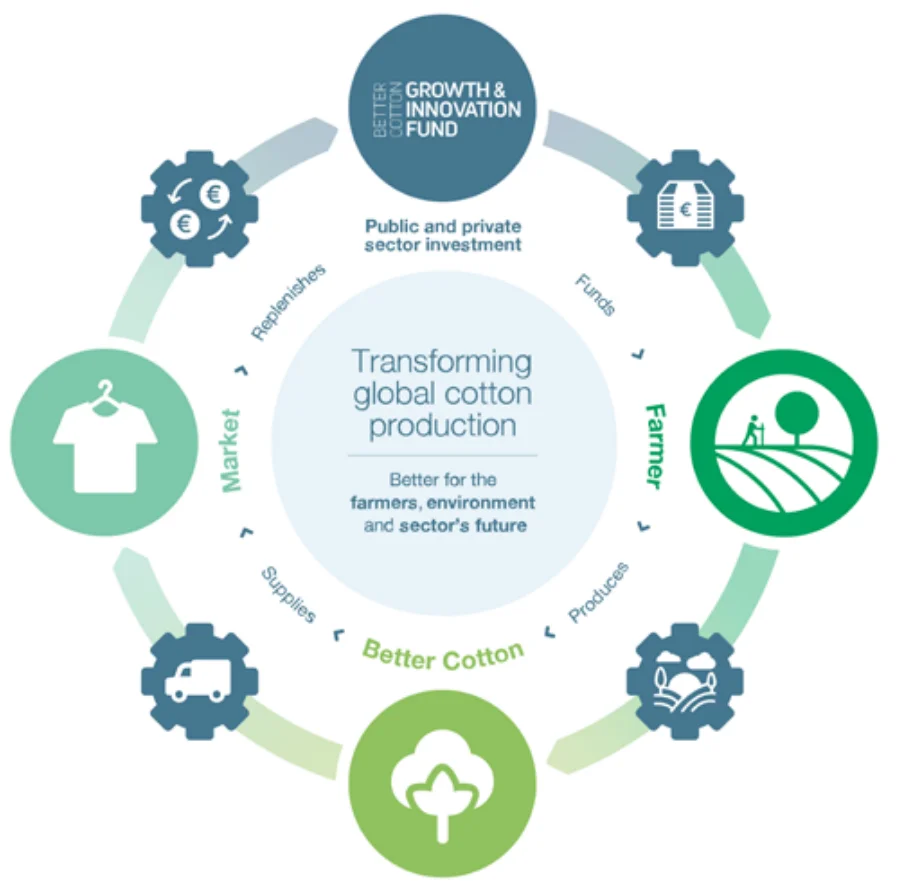

The Better Cotton Initiative Growth and Innovation Fund (GIF) is the Better Cotton Initiative’s internal fund. It supports our vision and mission with a field-level grant-making programme. In the 2023-24 season, the Better Cotton Initiative (BCI) trained over 1.6 million farmers, who produced 5.64 million tonnes of BCI Cotton. Of these, 1.3 million farmers (81%) and 1.4 million tonnes (24%) were funded through the GIF.


The GIF is primarily funded through volume-based fees paid to BCI by retailers and our members. The GIF also receives contributions from donors.
These funds are allocated to in-country Programme Partners, but also to innovative projects or research, large farm pilot projects, and expertise development.
Through these investments, the Fund can promote and support the mission of BCI and work with farming communities to improve incomes and conserve and restore the environment.
Channelling Funds Directly to Farming Communities
The GIF comprises four distinct sub funds: the Small Farm Fund, the Knowledge Partner Fund, the Innovation and Learning Fund and the Large Farm Fund. While each sub fund has its own unique objectives, all four sub funds are dedicated to driving change within farming communities and to supporting BCI’s 2030 Strategy.
In the 2024-25 season, the Small Farm Fund gave grants totalling €17.8m to 25 BCI Programme Partners and/or their local partners to support 35 projects in China, India, Mali, Mozambique, Pakistan and Türkiye. These projects involved more than 1.3 million cotton farmers and nearly 1.5 million workers, who received training and other support.
This Fund was financed by volume-based fees from BCI Retailer and Brand Members, and grants from Laudes Foundation, the H&M Group and IDH – The Sustainable Trade Initiative. A further €12.6 million was mobilised as co-funding from Programme Partners and their donors to create a total portfolio value of €30.4 million.
In addition, nearly €200,000 was committed to two Innovation and Learning projects, just under €290,000 was committed to four Knowledge Partner Fund projects, and nearly €245,000 was allocated to three Large Farm Fund projects.
You can read more about this year’s funding in the 2024-25 GIF Annual Report. Information related to GIF’s grant-making can be found in the GIF Mission and Vision and Guidelines documents. If you have a question that is not covered here, please complete the contact form.
Frequently Asked Questions About the Better Cotton GIF
Women’s empowerment and smallholder livelihoods are two of the five impact areas of BCI’s 2030 Strategy.
The GIF encourages Programme Partners working with farming communities to properly involve women by recruiting gender specialists who can design projects which cater to the specific needs of women, and by recruiting more women staff so that women feel comfortable participating in projects. We also fund activities with men so that they understand and recognise women’s important role in agriculture. This is a new area of work for most of BCI’s partners, but we are keen to use the Fund to contribute to gender transformative work where possible.
We are also eager to use the GIF to fund livelihood projects. Most funded projects focus on smallholder farms, but these are becoming less viable as the impacts of climate change make smallholder income increasingly precarious. While partners can support families to make their farms more profitable with improvements in cotton yield and fibre quality, or the cultivation of border and intercrops, the GIF also funds off-farm livelihood activities to improve resilience. This is a new area of work for many of BCI’s partners but is essential with extreme weather events becoming increasingly frequent.
Information on which organisations are eligible to apply can be found within the GIF Guidelines. The GIF will not accept unsolicited proposals.
The Better Cotton Initiative GIF is governed by the GIF Board and supported by an advisory committee, the Field Innovation and Impact Committee (FIIC), composed of BCI Retailer and Brand Members, Civil Society Members and donors. This advisory committee supports and approves the Fund’s grant-making programme. BCI Members who meet our contribution thresholds are invited to join this committee and participate in the development of the Fund’s investment strategy.
BCI staff manage the day-to-day activities of the Fund. The team is responsible for proposing and implementing the Fund’s strategy, managing and processing applications, promoting knowledge sharing, and reporting on the Fund’s activities.
Contributions to the Fund come from three main sources:
- BCI Retailer and Brand Members: Retailer and Brand Members contribute to the GIF through a fee based on the volume of BCI Cotton they source. This fee enables brands to directly and efficiently support field-level programmes.
- Institutional and Private Donors: To ensure the GIF can effectively make an impact in cotton communities around the world, we rely on institutional donors, trusts and foundations to match the fees contributed by BCI Retailer and Brand Members.
- Programme Partners: BCI Programme Partners are encouraged to directly invest in the projects they run through the GIF, either with their own resources or by using GIF grants to attract co-funders.
Yes, you can access the most recent GIF financial audits below:
Other Projects Funded by the GIF
In addition to projects delivered by Programme Partners with grants from the Small Farm Fund during the 2024-25 season, the GIF funded several projects through the three other sub funds. A few examples are mentioned below.
Innovation and Learning Fund: ODI
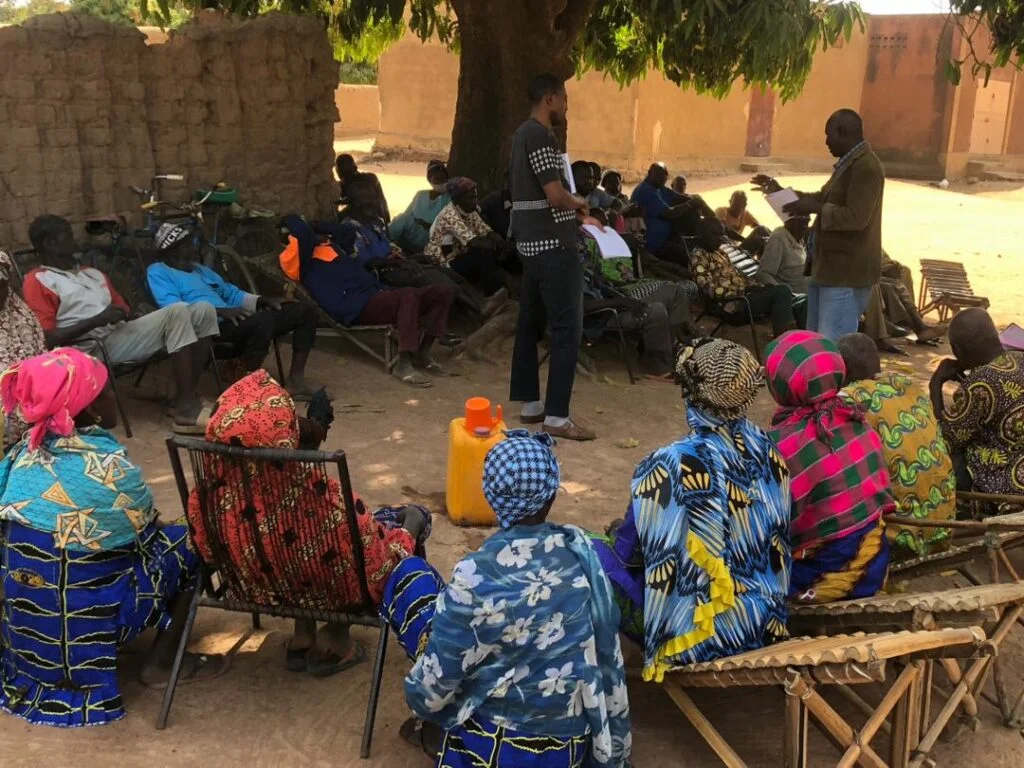

ODI is an independent think tank established in the UK in 1960. It publishes research to inform policy design to combat injustice and inequality.
With funding from GIF, ODI will examine the various livelihood activities that different members of farming households have taken up, under what conditions, and with what outcomes. The research will further explore what facilitates or hinders these activities for different household members; if diversified income sources result in more environmentally friendly cotton growing practices; and if they enable farmers to adapt to or mitigate against climate change. The research ultimately aims to understand what conditions are necessary for livelihood schemes to be successful. This information will be compiled into knowledge products, such as curricula or training videos, that will be shared with farmers and/or wider audiences.
Large Farm Fund: EMBRAPA
EMBRAPA is a state-owned research company affiliated with the Brazilian Ministry of Agriculture. Their project aims to reduce the use of synthetic pesticides, thereby reducing their environmental impact and the cost of producing cotton. It will do this by developing a practical and inexpensive method for the mass production of Parasitoid Catolaccus Grandis, a predator of the boll weevil, and piloting the use of ‘unmanned aerial vehicles’ to monitor boll weevil levels. It will also explore the cost/benefit ratio of controlling cotton pests with synthetic pesticides versus biological control, and compare the GHG emissions of farms using synthetic pesticides with those using biological pest control.
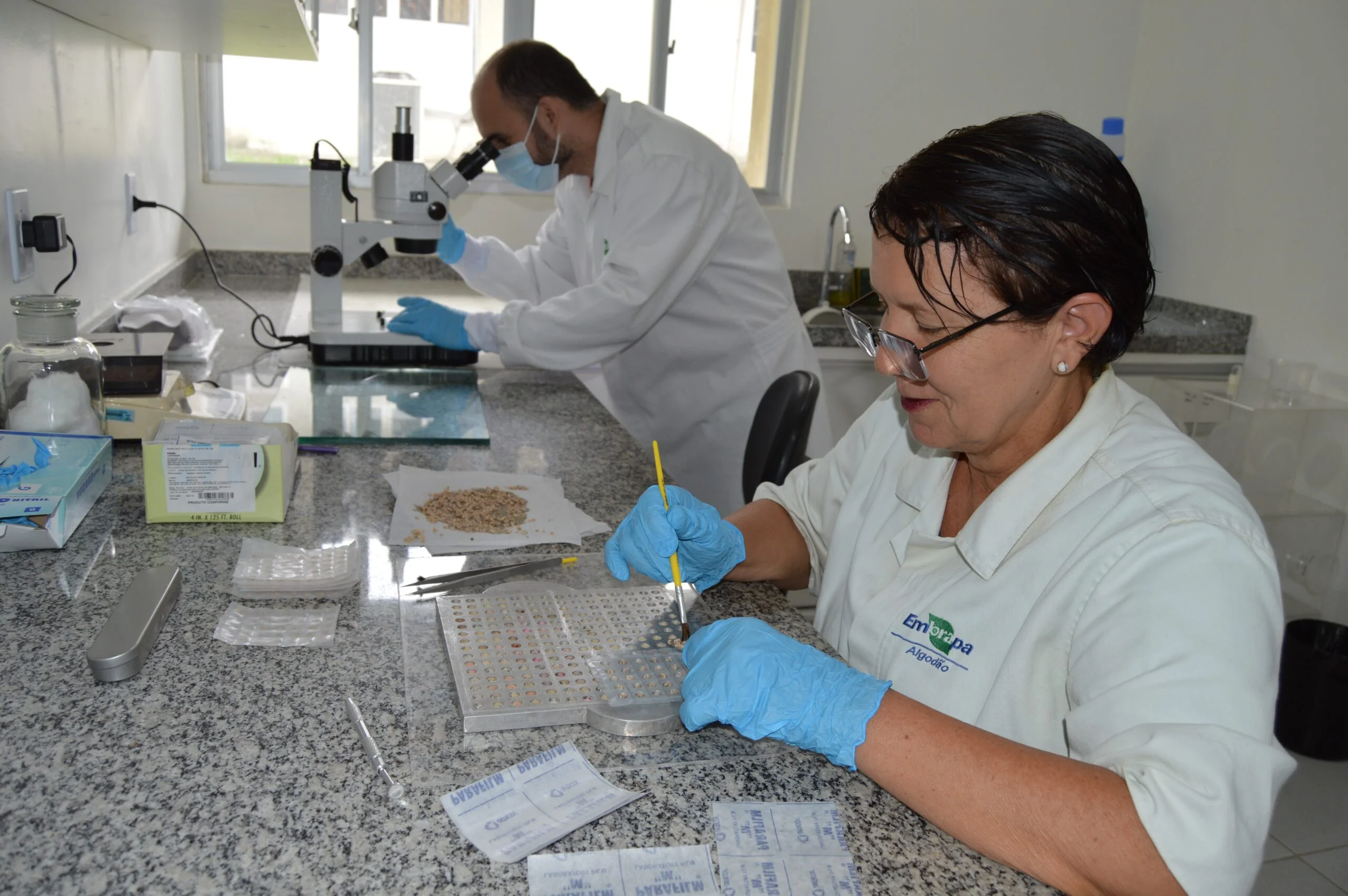

Knowledge Partner Fund: Pilio and SAMA^Verte
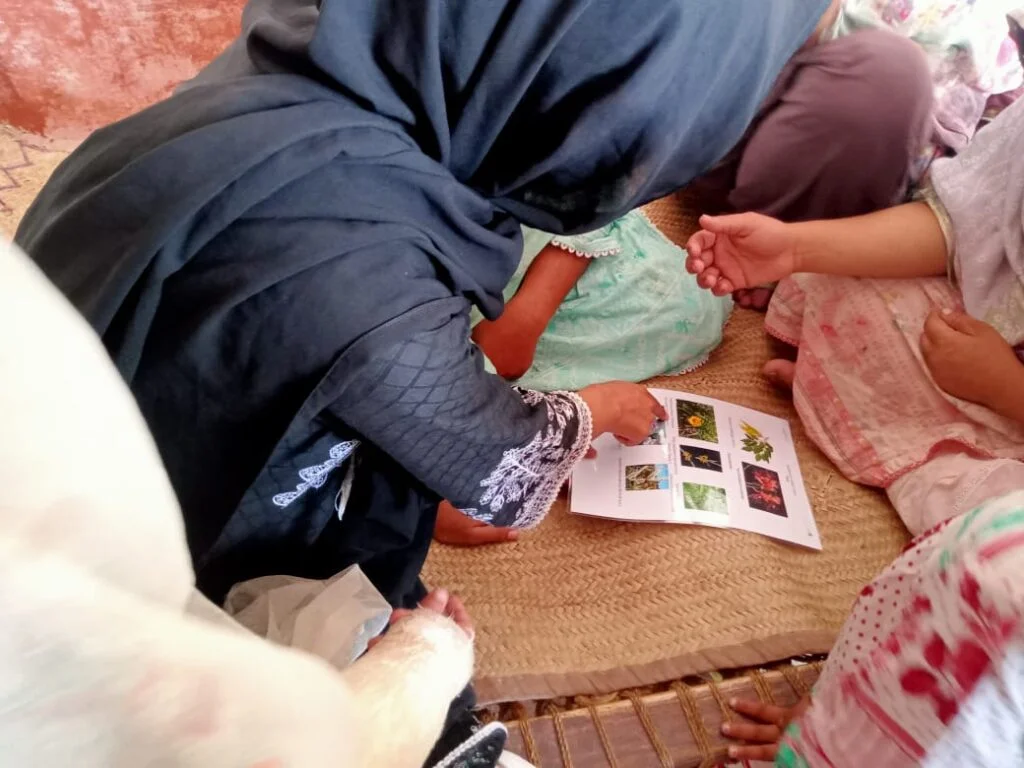

Pilio, an organisation providing energy, environment and climate software to private sector and government actors, and SAMA^Verte, a social enterprise proving environment, climate change and clean energy consultancy are collaborating to address biodiversity loss in the Punjab region of Pakistan.
The main areas of work being covered in this project include working with communities and our Programme Partner to develop a baseline methodology which directly leads to biodiversity enhancement in cotton growing communities. In years two and three of the project, it will support the implementation of the community-level biodiversity enhancement plans with 400 farmers in ten learning groups.
Want To Get Involved?
We are working hard to transform the global cotton sector by making BCI Cotton a sustainable, mainstream commodity. Financial and other support for farmers and field-level projects are essential to achieve this goal.
Join us in transforming the cotton industry and creating a better future for millions of cotton farmers, businesses and consumers around the world.
To learn more about how your organisation can get involved, get in touch via our contact form or by emailing Angela Russ, Director of Farm Support.








































